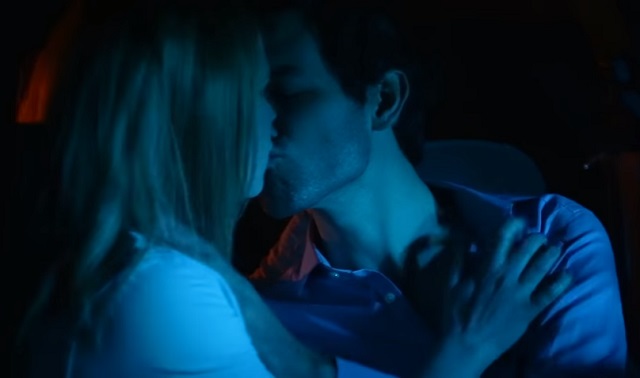We were curled up together, necking like teenagers.
Suddenly, a voice inside of me said, “Stop.”
I knew that sex would be next—and I also knew that on this first date it was sex too soon. I may be old-fashioned, but I knew myself well enough to know that waiting for sex would be the “right” thing to do.
I paused, untangled my arms and legs from hers, and I pulled away. She looked puzzled.
At that moment, the most appropriate thing I could have done was to throw my head back, like the chicken that I was, and cry, “Cluck, cluck, cluck!”
I was a chicken, scared to move to the next stage—and, as it turns out, we were never to consummate our pleasure together.
I regret that pause, wishing so much that I had gone with the flow from one erotic moment to the next. But I didn’t, and still today, I am the product of not trusting that moment.
The first secret to living without regret is to be just a little less chicken—to not let fear lead the way in the trek from this moment to the next.
Don’t resist fear, but welcome its hesitance and terrified nature. Let it fill your thinking when it must, but keep its scared fingers off of your experience.
Listen to fear, embrace it—but don’t act on it.
The second secret to living without regret is to slow down.
I just received a text from a friend of mine who lives a social, fast-paced life. This past weekend, he ignored his big inboard-powered motor boat, and instead, took his wife and two young kids out in my little red canoe.
Suddenly, he understood the lake differently. He listened to his family, and he felt the soft, natural breeze on his face and the resistance of the water to his paddle. He doesn’t regret the canoe ride, because he experienced so much. While there is nothing wrong with the motor boat, he and his son have never chatted while careening around the lake, and he has never noticed the contours of the shoreline or the shadow cast by an eagle.
Slowing down, propelling the boat with his own muscle, and noticing the quiet on the lake offered him experiences of closeness and love that made his life worth living—without regret.
His experiences were of attraction to the lake, to his family, and to the flow from one moment to the next. Rather than rushing, he let the moment come to him. A smile naturally graced his face, and joy rose within him.
Slowing down made him feel groovy, and it will make you feel groovy too, as the lyrics to the Simon and Garfunkel song suggest:
“Slow down, you move too fast,
You got to make the morning last,
Just kicking down the cobblestones,
Looking for fun and feelin’ groovy,
Ba da da da da da da, feelin’ groovy…”
When you are feeling groovy, there are no regrets.
And finally, the third secret to living regret free…
Regrets come in all shapes and sizes. There is the woman I didn’t approach in the coffee shop, the time I didn’t ask my boss for a raise, all those times when I could have hugged my kids and told them how cool they were, but instead was distracted by things that didn’t really matter.
When we don’t water our plants, they die. And when we don’t focus our attention on what really matters to us, we die so slowly that we don’t even notice.
The point isn’t to “grab for the gusto,” like the beer companies suggest—it is to treat each moment as if it is our first and our last.
Don’t delay gratification or procrastinate.
Treating each moment like it is our first and our last is, perhaps, the most important secret to disempowering regret.
The nature of regrets.
There are big regrets, little regrets, tall regrets, and small ones—and all regrets have on thing in common: they entail stalling and resisting the flow of our life from one moment to the next.
We want a moment to linger, and we mourn its passing. That is how regret starts. We want other moments—ones we don’t like—to hurry along, and they don’t do that either.
Treating each moment as though it is complete and special undermines regrets. It leads to a deep appreciate of now.
Each moment is all that we need. If we imagine that we need more, our attention focuses outside the moment—to the past or future—and we begin to build regrets.
It is our nature to regret, but it is worth remembering that regrets aren’t problems—they are just little nudges back into the present moment. Regrets, along with positive memories, are building blocks of a life well lived.
Regrets are tricky, though, because they build upon themselves. When we are overcome or distracted by regret, we miss the present moment—ensuring more regrets. When the preponderance of life’s building blocks are regrets, we don’t wish to live anymore; we experience depression and negativity.
Often, we find ourselves at the tipping point, in which regrets dominate our thinking, overshadowing our experience and presence. The present moment is our refuge from regrets. To enter the moment, listen to fear—but don’t act out of it. Slow down until you feel groovy, and treat this moment as if it is your first and last, making it so special that you actually live one perfect moment at a time.
~
Relephant:
4 Helpful Ways to Move Through Regret.
~
Author: Jerry Stocking
Image: screenshot
Editor: Yoli Ramazzina
Copy editor: Travis May
Social editor: Callie Rushton


 Share on bsky
Share on bsky





Read 1 comment and reply